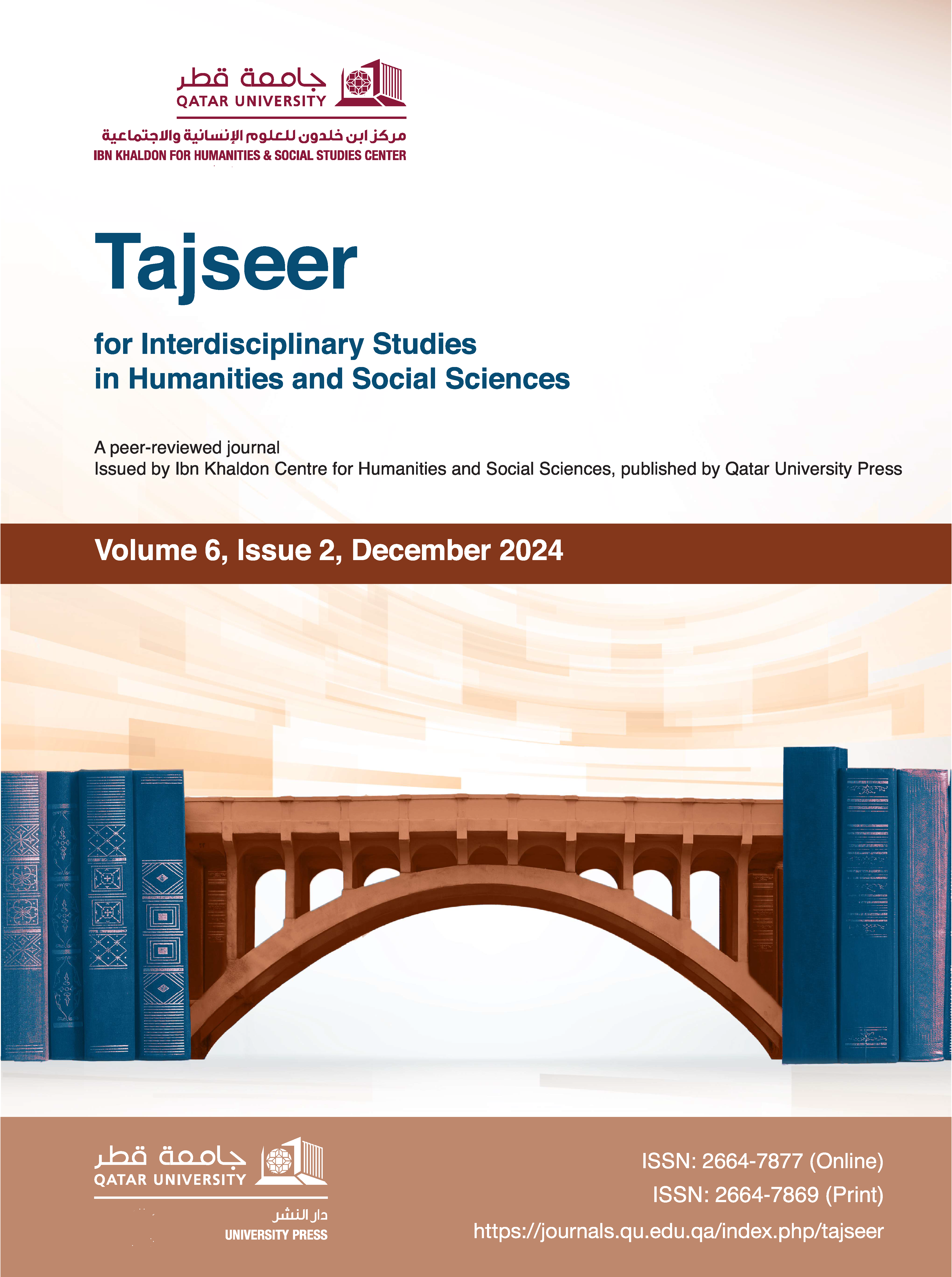Post-(De)colonial Thinking and the Other Half of Western Modernity: Abū Hayyān al-Tawḥīdī’s Humanism in the Renaissance of Islamc
Abstract
The postmodern condition constitutes an extremely important threshold from which we can productively engage with the modern episteme. However, what has been identified as a new historical rupture in postmodern theory does not mark the end of modernity as the new world system is both reminiscent of the colonial past and symptomatic of its neocolonial impulse. This entanglement between the colonial past and the neo-colonial present urges us to foster new epistemic sovereignties and cognitive paradigms in conversation with the postcolonial and decolonial visions of the world. If the postcolonial perspective involves the critical reconsideration of the Eurocentric legacy of modernity as a form of “cultural hegemony” and “epistemological bias”, the decolonial perspective seeks to delink from “the universal fictions of modernity” and subvert the legacy of Western “global linear thinking”. Informed by this critical consciousness, the aim of this paper is twofold; the first is to reconsider the problematic relationship between Islam and modernity from a postcolonial standpoint, while the second emphasizes the importance of the decolonial option in our endeavor to shift the geography of reasoning from Western cannons of thought into non-European traditions of knowledge. The article explores Abū Ḥayyān al-Tawḥīdī’s philosophical spirit as an instance of early Arab-Islamic humanism. Informed by postcolonial critical consciousness, I believe that the need to revisit the Muslim intellectual legacy of the “Golden Age” is vitally important to subvert the modern imperial episteme and reenergize hope in the ability of non-Eurocentric traditions of knowledge to foster new cognitive paradigms and canons of thought.
Metrics
##plugins.themes.bootstrap3.article.details##
Arabo-Islamic modernityModern epistemePostcolonialismArab humanismThe Decolonial option
Abu Rumman, M. Sufism Today: Contemporary Interpretations of the Sufi Community and Its Different Patterns. Amman: Friedrich-Ebert-Stiftung, 2015.
Al-Jabri, M. A. The Formation of Arab Reason: Text, Tradition and the Construction of Modernity in the Arab World. Trans. Center for Arab Unity Studies. New York: I. B. Tauris & Co. Ltd, 2001.
Alshaar A. N. Ethics in Islam: Friendship in the Political Thought of al-Tawhidi and his Contemporaries. New York: Routledge, 2015.
Al-Tawhıdı, Abu Hayyan and Ahmad b. Muhammad Miskawayh, Al-Hawa-mil waal-Shawamil, (in Arabic), Ahmad Amın and al-Sayyid Ahmad Saqr (eds.), Cairo: Lajnat al-Ta’lıf wa al-Tarjama, 1951.
–––. Al-Imta-‘wa al-Mu’ānasa, (in Arabic), Ahmad Amın and Ahmad al-Zayn (eds.), Beirut: al-Maktaba al-‘Asriyya, 1953.
–––. Al-Sadāqa wa al-Sadiq. (in Arabic), Ibrahım Kılanı (ed.), Damascus: Da-r al-Fikr, 1964.
–––. “Preface”. Al-Sadāqa wa al-Sadiq. Alshaar, A. Nuha, trans. Ethics in Islam: Friendship in the Political Thought of al-Tawhidi and his Contemporaries. New York: Routledge, 2015.
Aristotle. Nicomachean Ethics. Trans. Irwin. Batoche Books: Kitchener, 1999.
Arkoun, M. “L'Humanisme arabe au IVe/Xe siecle, d’apres le Kitab al-Hawamil wal- Sawamil”, Studia Islamica No. 14 (1961), pp. 73-108.
–––. “The Struggle for Humanism in Islamic Contexts”. Journal of Levantine Studies Summer No. 1 (2011), pp. 153-170.
Ashcroft, B. “Alternative Modernities: Globalization and the Post-Colonial.” Kyiv-Mohyla Humanities Journal Vol. 1, No. 1 (2014), pp. 3–26.
Bhabha, H. The Location of Culture: London: Routledge, 1994.
–––. “The Other Question: Discrimination and the Discourse of Colonialism” Screen. Vol. 24, No. 6 (1983), pp. 18–35.
Bolotin, D. Plato’s Dialogue on Friendship: An Interpretation of the Lysis, with a New Translation. Ithaca and London: Cornell University Press, 1979.
Chakrabarty, D. Provincializing Europe: Postcolonial Thought and Historical Difference. New Jersey: Princeton University Press, 2000.
Gandhi, L. Affective Communities: Anticolonial Thought, Fin De Siecle Radicalism, and the Politics of Friendship. Durham, NC: Duke University Press, 2006. https://doi.org/10.1215/9780822387657
Go, J. Postcolonial Thought and Social Theory. New York: Oxford University Press, 2016.
Grosfoguel, R. “The Epistemic Decolonial Turn”. Cultural Studies Vol. 21, No. 2-3 (2007), pp. 211-223. DOI: 10.1080/09502380601162514
–––. “The Multiple Faces of Islamophobia”. Islamophobia Studies Journal Vol. 1, No. 1 (2006), pp. 9-33 https://doi.org/10.13169/islastudj.1.1.0009
Hulme, P. “Beyond the Straits: Postcolonial Allegories of the Globe”. Postcolonial Studies and Beyond: Durham and London: Duke University Press, 2005. https://doi.org/10.1515/9780822386650-003
Key, A. “The Applicability of the Term ‘Humanism’ to Abū Ḥayyān al-Tawḥīdī”. Studia Islamica Vol. 100, No. 101 (2005), pp. 71-112.
Kraemer, L. J. “Humanism in the Renaissance of Islam: A Preliminary Study”. Journal of the American Oriental Society Vol. 104, No. 1(1984), pp. 135-164.
Loomba, A. & Suvir, K. et al. Postcolonial Studies and Beyond. Durham and London: Duke University Press, 2005.
Mignolo, D. W., & Tlostanova, M. V. “Theorizing from the Borders: Shifting to Geo- and Body-Politics of Knowledge”. European Journal of Social Theory Vol. 9, No. 2 (2006), pp. 205–221. https://doi.org/10.1177/1368431006063333
Mignolo, D. W., & Walsh, C. E. On Decoloniality, Concepts, Analytics and Praxis. Durham and London: Duke University Press, 2018.
Mignolo, D. W. “Epistemic Disobedience, Independent Thought and De-Colonial Freedom”, Theory, Culture & Society Vol. 26, No. 7–8 (2009), pp. 1–23. https://doi.org/10.1177/0263276409349275
–––. “Interview - Walter D. Mignolo”. In Critical Epistemologies of Global Politics. Mark Woons and Sebastian Weir eds. Bristol: E-International Relation, 1017.
Petrarch. “Letter to the Shade of Cicero”. In The Civilization of the Italian Renaissance: A Sourcebook, Second Edition. Ed. Kenneth Bartlett. Canada: University of Toronto Press, 2001.
Plato. “Symposium”. In Great Dialogues of Plato. Trans. W. H. D. Rouse. London: Penguin Publishing Group, 2015
Said, E. Culture and Imperialism. London: Vintage, 1993.
–––. Orientalism. New York: Pantheon, 1978.
Santos, de Sousa B. The End of Cognitive Empire: The Coming of Age of Epistemologies of the South. Durham and London: Duke University Press, 2018.
Trinkaus, E. C. “Italian Humanism”. Scope of Renaissance Humanism. Michigan: University of Michigan Press, 1983.
Young, R. Postcolonialism: An Historical Introduction. Massachusetts: Blackwell, 2001.
*********************************************************************************************
التوحيدي، أبو حيان. الإمتاع والمؤانسة. تحقيق أحمد أمين وأحمد الزين. بيروت: المكتبة العصرية، 1953.
–––. الصداقة والصديق. تحقيق إبراهيم الكيلاني. دمشق: دار الفكر، 1964.
–––. الهوامل والشوامل. تحقيق أحمد أمين والسيد أحمد صقر. القاهرة: لجنة التأليف والترجمة، 1951.
عبد الرحمن، طه. روح الحداثة: المدخل إلى تأسيس الحداثة الإسلامية، الدار البيضاء: المركز الثقافي الدولي، 2006.



 https://orcid.org/0000-0001-7348-9319
https://orcid.org/0000-0001-7348-9319